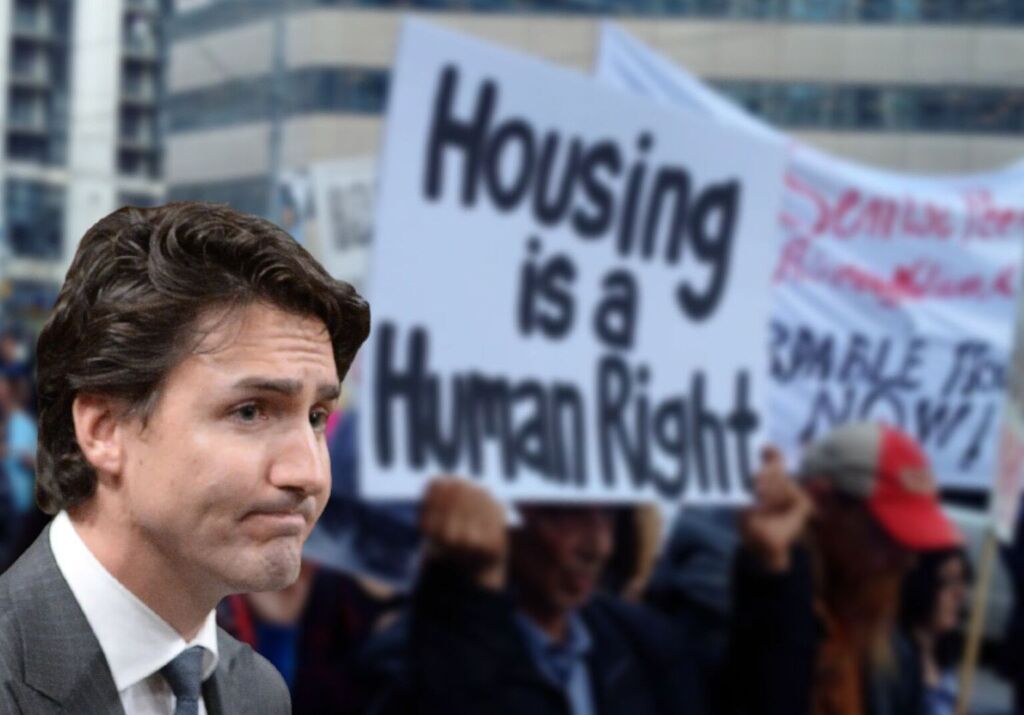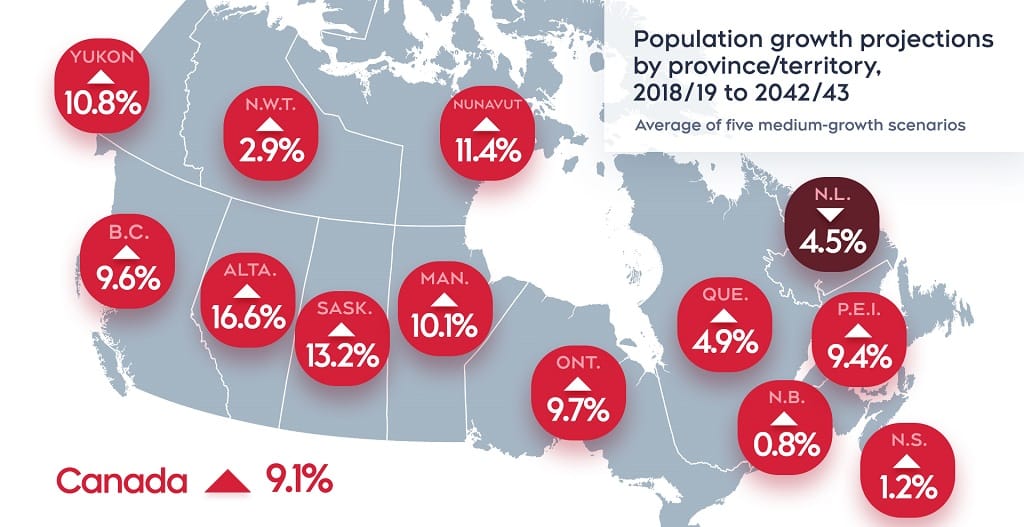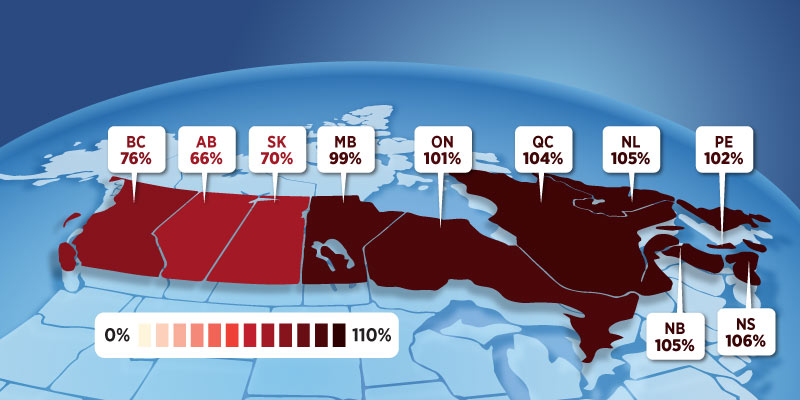News
Canada’s Housing Bubble Could Spell Disaster for Trudeau

According to experienced strategists, Canada’s housing market is in danger of collapsing since it has one of the greatest housing bubbles in history. The degree of debt that Canadians have taken on in contrast to their earnings has left many in a perilous situation if mortgage rates continue to climb, which is likely, according to Phillip Colmar, partner at MRB Partners, in an interview on Tuesday.
“Canada is probably sitting on the largest housing bubble of all time,” he said.
Colmar suggested that inflated housing prices in Canada are a result of the Bank of Canada’s monetary policy providing easy money for two decades for a variety of reasons. Currently, he sees risk in mortgage rates rising as Canadian bond yields rise, especially at a time when debt-to-income ratios are sky high.
“The worst part for a housing bubble is when you have [a] credit bubble underneath it,” Colmar cautioned. The amount of Canadian indebtedness in the system against income is tremendous — and debt servicing has increased dramatically.”
While Canadian banks are doing their lot to keep the property market from collapsing, Colmar predicts it will.
There is clearly a risk that if mortgage rates rise, unemployment rises, or we enter the next recession, this thing will wind up in a deleveraging cycle, he added.
Trudeau Hasn’t Helped in Canada’s Soaring Housing Cost
The rising cost of housing in Canada has become a key electoral issue for Prime Minister Justin Trudeau, as his main opponent focuses on generational frustrations over affordability.
This summer, Trudeau has played defence on the problem, naming a new housing minister and diverting some of the burden to other levels of government. However, with Trudeau’s party already slipping in recent surveys, housing has become a serious vulnerability for him.
“Failure to appear to be doing enough on housing could be politically disastrous for the Liberals,” David Coletto, CEO of polling firm Abacus Data told Bloomberg.
The issue is especially crucial for Canadians under 40, a critical group that Trudeau’s party could not have won the last two elections without, according to Coletto. His firm’s most recent survey showed Pierre Poilievre’s Conservatives leading the Liberals by ten points.
The average price of a home in Canada has more than quadrupled in the last decade, reaching $760,600 (US$572,470) in June. Trudeau’s government, which took office in 2015, has also steadily increased yearly immigration targets, with more than one million people coming last year, putting a strain on an already scarce housing supply.
Poilievre has pounded Trudeau on the issue, concentrating on young people’s rage. He told reporters outside the Parliament building in Ottawa on Tuesday that Canada’s home affordability is among the worst in the world.
“Rent has more than doubled,” he remarked. “Mortgage payments have doubled.” Down payments were required and doubled. All of this comes after eight years of Justin Trudeau.”
To be fair, rising housing costs have many causes outside of Trudeau’s control. Provinces and cities, which are in charge of land-use planning, zoning, and permitting, are to fault, as are real estate investors, overseas buyers, years of low loan rates, and other issues.
Nonetheless, Canada’s aggressive immigration ambitions have outpaced housing construction, exacerbating the demand-supply imbalance. In the year to March, 4 to 5 international migrants landed in Canada for every new unit of housing construction that began. That is the highest ratio of new Canadians to new residences in statistics dating back to 1977.
Poilievre, on the other hand, dodged reporters’ inquiries on whether he will lower immigration targets on Tuesday.
Former Liberal member Adam Vaughan, who assisted in the development of Trudeau’s $82 billion national housing policy, said that the country is better off now than it would have been without his party’s policies. He claims that if the government had done nothing, federal spending on social housing would have been merely $1 billion this year.
More needs to be done, he says, and time would be better spent concentrating on solutions across levels of government rather than laying blame. Trudeau’s remark on Monday that housing is not a fundamental federal priority was “problematic,” according to Vaughan.
“It is a responsibility of the federal government, if not literally, then politically, and I would argue that it is morally,” said Vaughan, who now works at public relations firm Navigator.
According to Mike Moffatt, senior policy and innovation director at the Smart Prosperity Institute, the federal government has a number of instruments at its disposal to address the housing shortfall without increasing its debt.
These approaches include focusing immigration policy on construction workers, electricians, and others who could help increase housing supply, as well as postponing international student visa approvals until provinces order universities to provide additional accommodation for them.
If the government does act, “they had better act quickly because time isn’t on their side, and there’s a chance that one of the opposition parties could really start to own this issue,” Moffatt said.
Former Trudeau policy director Marci Surkes believes the government is working on a housing strategy as a core component of its fall budget update.
“This is ground that the Liberal Party should be occupying and owning,” said Surkes, who currently works as an adviser for the Compass Rose Group. “At this point, they should have been making more tangible progress.” And yet, given the economic circumstances, whatever progress has been made to date does not feel sufficient.”
The New Democratic Party’s Jagmeet Singh, whose party has agreed to support the Liberal minority government in Parliament, said on Tuesday that Trudeau’s “finger-pointing” will not fix the housing crisis, despite the fact that all levels of government bear some responsibility.
“We can’t ignore the significant levers that the federal government has,” he remarked. “The levers are so significant that I would say the federal government has incredible powers to actually solve this problem if they choose to do so.”
News
Britain Must Be Ready for War in 3 Years, Warns New Army Chief

The new head of the Army has stated that Britain must be prepared to fight a war within three years.
Gen Sir Roland Walker has issued a warning about a variety of risks in what he calls a “increasingly volatile” environment.
However, he stated that war was not inevitable and that the Army had “just enough time” to prepare to prevent conflict.
He stated that the Army’s fighting capacity would be doubled by 2027 and tripled by the end of the decade.
Gen Walker warned that the Britain was under threat from a “axis of upheaval” in his first speech as Prime Minister on Tuesday.
Among the primary concerns confronting the Britain in the next years, as noted by the general in a briefing, is an enraged Russia, which may seek vengeance on the West for helping Ukraine, regardless of who wins the war.
He stated: “It doesn’t matter how it finishes. I believe Russia will emerge from it weaker objectively – or completely – but still very, very dangerous and seeking some form of retaliation for what we have done to assist Ukraine.”
Britain’s Government Defence Review and Military Challenges
He also warned that China was determined to retake Taiwan, and Iran was likely to seek nuclear weapons.
He stated that the threats they posed may become particularly acute in the next three years, and that these countries had formed a “mutual transactional relationship” since the war in Ukraine, sharing weaponry and technology.
However, he stated that the path to conflict was not “inexorable” if the UK re-established credible land troops to assist its deterrent strategy for avoiding war.
In his speech, he described his force of slightly over 70,000 regular troops as a “medium-sized army” and made no direct call for additional resources or men.
However, he pushed the British Army to adapt swiftly, focussing on technology such as artificial intelligence and weaponry rather than numbers.
His ultimate goal is for the Army to be capable of destroying an opponent three times its size.
This would entail firing quicker and farther, he said, aided by lessons learnt from the Ukraine war.
The general’s speech at the Royal United Services Institute land warfare conference comes only one week after the government began a “root and branch” defence review to “take a fresh look” at the challenges facing the armed services.
Defence Secretary John Healey launched the assessment, describing the existing status of the armed forces as “hollowed-out” and stating that “procurement waste and neglected morale cannot continue”.
According to the most recent Ministry of Defence (MoD) numbers from April 2024, the Britain’s regular Army forces total 75,325 troops (excluding Gurkhas and volunteers).
That figure has been declining in recent years, as recruiting has failed to match retention. The previous Conservative administration lowered the planned headcount from 82,000 to 72,500 by 2025.
Members of the NATO military alliance have agreed to spend at least 2% of GDP on defence by 2024, but several countries are unlikely to fulfil this goal.
The Britain presently spends 2.3% of its GDP on defence. Prime Minister Sir Keir Starmer has previously stated that the defence review will include a “roadmap” for increasing this to 2.5%, however he has yet to provide a date for this promise.
Source: BBC
News
Katie Ledecky Hopes For Clean Races At Paris Olympics In The Aftermath Of The Chinese Doping Scandal

PARIS — Katie Ledecky is looking for clean Olympic races. On Wednesday, Hope had pretty much reached her limit.
The American swimmer hopes to add to her six gold medals as she competes in the 400, 800, and 1,500 meters at the Paris Games. Her program starts with the heavy 400 on Saturday, featuring Ariarne Titmus and Summer McIntosh.

Katie Ledecky | ESPN Image
Katie Ledecky Hopes For Clean Races At Paris Olympics In The Aftermath Of The Chinese Doping Scandal
The 27-year-old Katie is competing in her fourth Summer Olympics, but the first since a doping scandal involving almost two dozen Chinese swimmers who tested positive for a banned chemical before the Tokyo Games — yet were permitted to compete with no consequences. The controversy has raised serious worries regarding the effectiveness of anti-doping initiatives.

Katie Ledecky | Vogue Image
“I hope everyone here is going to be competing clean this week,” Ledecky claimed. “But what truly counts is, were they training cleanly? Hopefully this has been the case. Hopefully, there has been worldwide testing.”
The International Olympic Committee has expressed concern over the ongoing US investigation into possible doping by Chinese swimmers. While awarding the 2034 Winter Olympics to Salt Lake City on Wednesday, the IOC urged Utah officials to do whatever they could to stop the FBI investigation.
“I think everyone’s heard what the athletes think,” Katie added. “They seek transparency. They want more answers to the remaining questions. At this point, we are here to race. We are going to race whoever is in the lane next to us.
“We are not paid to conduct the tests, so we trust those who follow their regulations. That applies both today and in the future.

Katie Ledecky | ESPN Image
Katie Ledecky Hopes For Clean Races At Paris Olympics In The Aftermath Of The Chinese Doping Scandal
SOURCE | AP
News
London Heatwave Alert: High Temperatures Set to Soar to 29C Next Week

As the summer holidays begin, London may experience an official heatwave with temperatures reaching up to 29 degrees Celsius.
The Met Office predicts a long period of sunny and dry weather for London after a soggy spring and summer.
After a cloudy day on Saturday, temperatures are expected to reach 27C on Sunday, with lots of sunlight.
On Monday and Tuesday, temperatures are forecast to peak at 29 degrees Celsius. Monday is forecast to offer more sunlight, while Tuesday may see some gloomy weather.
Temperatures are expected to remain in the high 20s next week, with lows of approximately 18C.
According to the Met Office, a heatwave is “an extended period of hot weather relative to the expected conditions of the area at that time of year, which may be accompanied by high humidity.”
In the United Kingdom, a heatwave is proclaimed when daily temperatures meet or surpass a certain level for at least three consecutive days.
In London, the heatwave threshold is 28 degrees Celsius.
The Met Office reported that the UK is experiencing hotter and wetter weather on average due to climate change.
The UK experienced its warmest May and April on record this year, despite damp and dismal conditions in many areas.
According to the Met Office’s State Of The UK Climate 2023 report published on Thursday, the UK experienced historic levels of extreme weather last year.
In the United Kingdom, 2023 was the second warmest year on record, bringing storms, flooding, strong heatwaves, and rising sea levels; only 2022 was warmer.
It was 0.8°C higher than the average from 1991 to 2020, and 1.66°C higher than the 1961 to 1990 average.
However, 2023 will be a “cool year” in comparison to 2100, based on the planet’s warming trajectory.
The government’s plan to adapt to the hazards presented by climate change is currently being challenged in the High Court by campaigners who allege the Tory administration’s July 2023 National Adaptation Programme (NAP) fails to adequately address 61 concerns.
Source: The Standard
-
World2 weeks ago
Former President Trump Survives Being Shot at Pennsylvania Rally
-
Tech4 weeks ago
Huawei Launches 5G-A Pioneers Program at MWC Shanghai 2024: Paving the Way for a Connected Future
-
Tech4 weeks ago
ChatGPT Answers Undiscovered Questions and Outperforms Students.
-
Sports4 weeks ago
NBA Draft: Kyle Filipowski Withdraws Unexpectedly From The First Round
-
News4 weeks ago
US Supreme Court Rejects Drug Deal that Protects the Sackler Family
-
Health4 weeks ago
US Health Agency Issues Dengue Virus Infection Warning





















